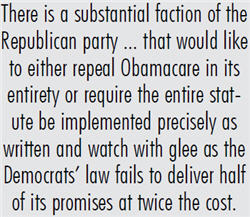Republicans: Stop Allowing Vocal Ideologues To Dictate Health Policy
By John McManus, president and founder, The McManus Group
 While it is understandable why many members of Congress fear crossing their ideological base, it is high time for Republicans and Democrats alike to disregard ideological rigidity and come together on reasonable and modest reforms that can strengthen the health system and bring greater efficiencies.
While it is understandable why many members of Congress fear crossing their ideological base, it is high time for Republicans and Democrats alike to disregard ideological rigidity and come together on reasonable and modest reforms that can strengthen the health system and bring greater efficiencies.
For decades, when Republican leadership constructed legislation, attention was focused on maintaining support of moderate Republican members, often in Democratic-leaning suburban districts. But three recent developments gave impetus to the conservative base driving negotiations and legislation within the caucus:
- Redistricting, whereby state legislatures gerrymandered district lines to make Republican districts more conservative (and Democratic districts more liberal).
- The Supreme Court decision to allow thirdparty groups to spend unlimited “independent expenditures” educating the public on certain issues or members’ votes.
- The rise of the grass-roots Tea Party.
Republicans are now more concerned about a primary challenge from their base than a Democratic challenge from the center/left. The primary defeat of prominent main-street Republicans such as Senator Bennett (R-UT), Rep. Castle (R-DE), and Rep. Stearns (R-FL), among others, struck fear in a number of Republicans and now drives their decision making on many matters, but healthcare above all else.
This explains why the Republican House leadership was forced to scuttle a modest bill that would have removed funds from an Obamacare slush fund in order to finance high-risk pools for uninsurable individuals, another Obamacare initiative that had run out of money because too many sick people signed up. The bill was a clever initiative because it simultaneously 1) defunded a slush fund for prevention that Secretary Sebelius was tapping to establish federal health exchanges in those states refusing to set up their own exchanges and 2) addressed a real policy problem with Obamacare, which had low-balled the resources it would take to provide assistance to uninsurable individuals through high-risk pools — a policy proposal Republicans had embraced for years.
The Club for Growth and Heritage Action — two notorious conservative groups known to drop tens of millions of dollars on Republicans they find not conservative enough, or “RINOs” (Republicans in name only) as they dub them — sprang into action. They issued alerts to their members and threatened retribution to any Republican who supported Majority Leader Cantor’s bill on the issue. The bill also drew the ire of AARP and several left-leaning groups, so bipartisan consensus could not be achieved, and a floor vote has been indefinitely delayed.
The issue is endemic of a larger problem that Republicans confront in approaching health policy. There is a substantial faction of the Republican party and the base that would like to either repeal Obamacare in its entirety or require the entire statute be implemented precisely as written and watch with glee as the Democrats’ law fails to deliver half of its promises at twice the cost. Two score and counting repeal votes in the House have been unsuccessful in getting the Democrat-controlled Senate to move.
Now Tea Party activists Senators Ted Cruz (R-TX) and Mike Lee (R-UT) are demanding that Congress defund Obamacare this fall when it votes on the appropriations bills that fund the federal government. Even if that bill passed the Senate with some Democrat support, it would be vetoed by President Obama and a 2/3 majority from both chambers would be required to override. They simply don’t have the votes, and bringing the government to the brink on an issue that has been settled by the Supreme Court and the 2012 election makes no sense.
What Should Congress Focus on This Fall?
The Obama administration is scrambling to implement the greatest change to healthcare policy in the history of the country, but by all indications, it will not be ready, and chaos will roil the health sector.
- The Supreme Court made the Medicaid expansion optional to states, and only 24 states with 5.4 million of the 15 million potential new enrollees have affirmatively announced they will proceed with the expansion.
- More troubling, 27 states have indicated they will not establish their own exchanges, which will offer subsidized insurance policies available to individuals above the poverty level. A recent Government Accountability Office report found that implementation of the federal exchanges for those 27 states by October 1 is uncertain and that CMS is behind on activities that cross “the core exchange functional areas.”
 Meanwhile, in a glimmer of hope to end the paralysis, the Energy & Commerce Committee came together this summer and reported out a bipartisan bill to repeal the flawed Medicare physician payment formula, the “SGR.” That formula has been overridden more than 15 times in the past 10 years in stop-gap fashion where Congress kicked the can down the road without finding a permanent solution to the pending 25% payment cuts or reforming a fee-for-service system that rewards volume instead of quality.
Meanwhile, in a glimmer of hope to end the paralysis, the Energy & Commerce Committee came together this summer and reported out a bipartisan bill to repeal the flawed Medicare physician payment formula, the “SGR.” That formula has been overridden more than 15 times in the past 10 years in stop-gap fashion where Congress kicked the can down the road without finding a permanent solution to the pending 25% payment cuts or reforming a fee-for-service system that rewards volume instead of quality.
It would be a real achievement to permanently repeal this unworkable formula and set the system on a path focused on patient outcomes. But how is Congress going to find the $140 billion to $160 billion necessary to fund this change over the 10-year budget window? That’s where bipartisan consensus is likely to break down.
A little-discussed option would be to delay implementation of Obamacare spending for one year.
- While the Medicaid expansion and new subsidies for individuals in the exchange cost only $49 billion in 2014, Congress could grab $170 billion of savings over the 10-year budget window because that represents Obamacare spending in 2023 — the last year in the budget window — which would now be pushed outside the window. That is more than enough resources to clean up SGR and other temporary policies that Congress has failed to fundamentally address.
- The one-year delay would give the administration valuable time to ensure that the signature domestic achievement of the Obama Administration gets implemented properly. (Even the Obamacare architects stipulate that the bill that became law was never intended to be the final product, but a bill to get the Senate to conference. The 2010 election of Scott Brown in Massachusetts destroyed the Democrats’ 60-vote control of the Senate chamber and compelled the House to enact the Senate bill in its entirety.) But a delay requires Democrats to take their foot off the gas and acknowledge that time is needed to make necessary changes.
- Republicans would agree to technical changes to make Obamacare implementation more workable. Those fixated on full repeal could view a one-year delay as a repeal-on-installment-plan as it blocks spending in 2014.
- To attract Republican support, Democrats should agree to a policy win for the Republicans, such as repealing the reviled Independent Payment Advisory Board, which can rewrite Medicare payment and coverage policy without congressional input when certain spending triggers are hit.
- Republicans should also reject the Heritage Foundation’s assertion that SGR reform should not be linked to “pay for performance” for physicians who meet quality metrics developed by physician medical societies and implemented by Medicare. Far right skepticism of best practices developed by the physician community is unfounded.
- For any of these sensible changes to take place, Republicans and Democrats need to work together across the aisle and ignore the dogmatic radicals of their respective bases calling for outright repeal on one side and immediate, unaltered implementation on the other.
